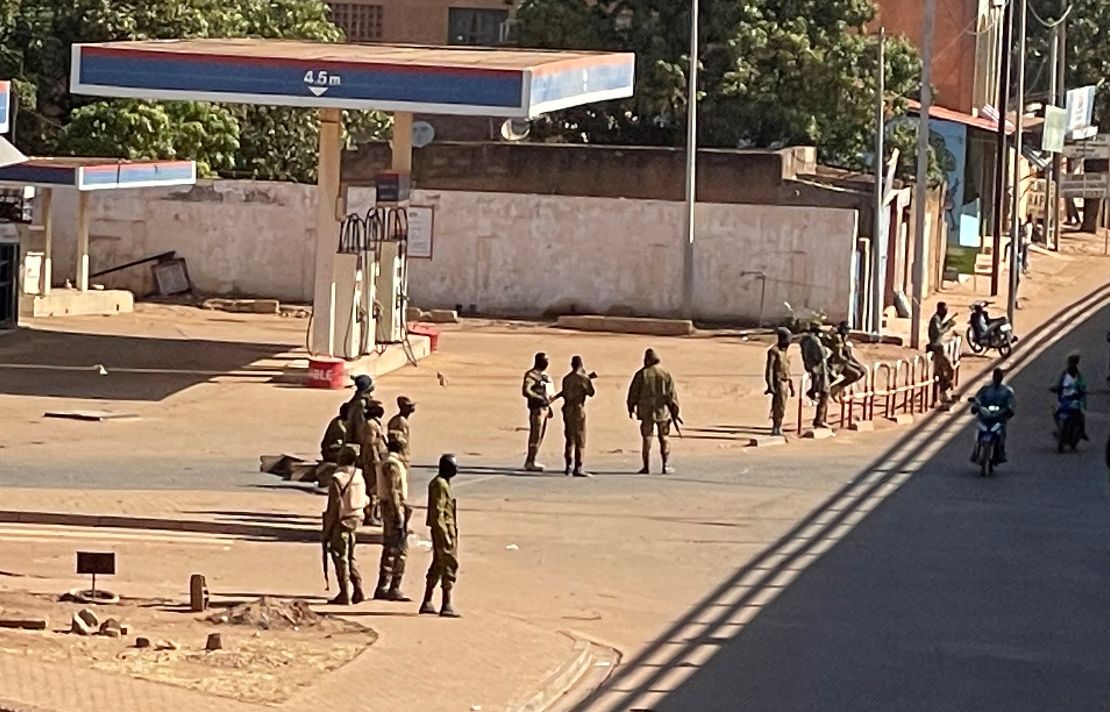Burkina Faso’s army said it took control of the country on Monday, deposing President Roch Kabore, dissolving the government and parliament, suspending the constitution and shuttering its borders.
The coup was announced on state television by Captain Sidsore Kader Ouedraogo, who said the military had seized power in response to the “ongoing degradation of the security situation” in the country and the “incapacity of the government” to unite the population.
Sitting alongside him dressed in military fatigues and a red beret was Lieutenant Colonel Paul-Henri Damiba, a senior military officer who was introduced to the people of Burkina Faso as their new leader.
Damiba was promoted in December by Kabore to commander of the country’s third military region, which is responsible for security in the capital Ouagadougou, according to Reuters. He studied at a military academy in Paris, and recently authored a book titled “West African Armies and Terrorism: Uncertain Responses?”
There was no mention made in the televised statement about Kabore’s whereabouts. The president has not been seen in public since fighting broke out on Sunday around the presidential palace in Ouagadougou.
One of the coup leaders told CNN that Kabore was detained early Monday by soldiers that had taken control of a military base before storming the palace grounds and firing shots near the president’s home. The same source said that Kabore signed his resignation and is being kept in a “safe place” in the West African country.

But Kabore’s exact location remains unknown; on Monday afternoon, a message was posted from his Twitter account asking those involved in the insurrection to lower their arms.
“Our nation is going through difficult times,” the tweet said. “We must in this precise moment, preserve our democratic achievements. I invite those who took arms to lower them in the superior interest of the nation. It is through dialogue and listening that we must resolve our contradictions.”
The United Nations Secretary-General António Guterres is concerned about the whereabouts of President Kabore and is following developments in Burkina Faso closely, his spokesman Stephane Dujarric said in a Monday statement.
Pictures from Ouagadougou on Monday showed armed vehicles and soldiers parked outside the headquarters of the state broadcaster, Radio Télévision du Burkina (RTB).
Plans for the military coup have been underway since August, hatched in encrypted messaging apps and countless secret meetings held outside the capital, one of the coup leaders told CNN, adding that the soldiers are angry at the government’s handling of jihadist attacks in the country, and believe Burkina Faso is better off under military rule right now.
Civilians gathered on the streets honking car horns and cheering in support of the military following Monday’s announcement.
“People are fleeing their homes and people are dying everywhere because of terrorism. The situation is not solved. If the army takes the lead I think things will go back to normal,” said Oumar Junior Bahoro, who was protesting in downtown Ouagadougou.
The Economic Community for West Africa States (ECOWAS) posted a statement on Facebook Monday saying it was watching “with great concern the political and security situation in Burkina Faso, following an attempted coup d’état.”
ECOWAS demanded that the “soldiers return to the barracks, maintain a Republican situation and favor dialogue with the authorities to resolve problems,” adding that it held the military responsible for Kabore’s wellbeing
On Monday, the French embassy in Burkina Faso posted a message on its website warning its citizens in the country that the situation “remains rather confusing.”
“In the wait for a clarification, we recommend that you avoid non-essential movements during the day and do not go out at night,” the message said.
Two Air France flights scheduled for Monday evening were also canceled, according to the embassy.
‘Mounting dissatisfaction’
Burkina Faso has been wracked with violence linked to the Islamic State and al Qaeda that has killed thousands and displaced 1.5 million people, according to UNHCR. The military has been hard hit; last month at least 50 security forces were killed in the Sahel.
Anger has been mounting across the country for weeks. The coup comes one day after a protest in the capital demanding the president’s resignation.
“This coup attempt isn’t coming out of nowhere. It’s building on mounting dissatisfaction within the population and security forces with the government’s handling of the security crisis,” said Constantin Gouvy, a Burkina Faso researcher who works for the Netherlands-based Clingendael Institute. Kabore has championed a military-first approach since being first elected in 2015 and it’s not been successful, he said.
Reuters reported that sustained gunfire rang out from military camps in the West African country on Sunday, as soldiers demanded more support for their fight against Islamist militants.
Protesters came out to support the mutineers on Sunday and ransacked the headquarters of Kaboré’s political party, according to the news agency.
The government declared a curfew until further notice and closed schools for two days.
The turmoil in Burkina Faso comes after successful military putsches over the past 18 months in its West African neighbors Mali and Guinea, where the army removed President Alpha Conde last September.
West Africa, which until recently appeared to have shed its reputation as Africa’s “coup belt,” remains susceptible to unrest.
The military also took over in Chad last year after President Idriss Deby died on the battlefield there.
Burkina Faso is one of the poorest countries in West Africa – despite being a gold producer.
Its army has suffered heavy losses at the hands of Islamist militants, who control swathes of the country and have forced residents in those areas to abide by their harsh version of Islamic law, Reuters reports.
CNN’s Sam Mednick reported from Ouagadougou and Niamh Kennedy reported from Dublin. Reuters contributed reporting.





